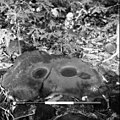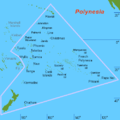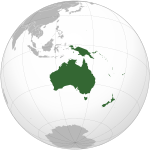Portal:Oceania
The Oceania PortalOceania (UK: /ˌoʊsiˈɑːniə, ˌoʊʃi-, -ˈeɪn-/ OH-s(h)ee-AH-nee-ə, -AY-, US: /ˌoʊʃiˈæniə, -ˈɑːn-/ OH-shee-A(H)N-ee-ə) is a geographical region including Australasia, Melanesia, Micronesia, and Polynesia. Outside of the English-speaking world, Oceania is generally considered a continent, while Australia is regarded as an island or a continental landmass contained inside of the larger continent of Oceania. Spanning the Eastern and Western Hemispheres, at the centre of the water hemisphere, Oceania is estimated to have a land area of about 9,000,000 square kilometres (3,500,000 sq mi) and a population of around 44.4 million as of 2022. When compared to the continents (which it is often compared to, not including Australia), Oceania is the smallest in land area and the second-least populated after Antarctica. Oceania has a diverse mix of economies from the highly developed and globally competitive financial markets of Australia, French Polynesia, Hawaii, New Caledonia, and New Zealand, which rank high in quality of life and Human Development Index, to the much less developed economies of Kiribati, Papua New Guinea, Tuvalu, Vanuatu, and Western New Guinea, while also including medium-sized economies of Pacific islands such as Fiji, Palau, and Tonga. The largest and most populous country in Oceania is Australia, and the largest city is Sydney. Puncak Jaya in Highland Papua, Indonesia, is the highest peak in Oceania at 4,884 m (16,024 ft). The arrival of European settlers in subsequent centuries resulted in a significant alteration in the social and political landscape of Oceania. The Pacific theatre saw major action during the First World War with the Japanese occupying many German territories. During the Second World War, Allied powers including the United States, the Philippines (a U.S. Commonwealth at the time), and Australia fought against Axis power Japan across various locations in Oceania. (Full article...) Selected geographic article - New Hebrides, officially the New Hebrides Condominium (French: Condominium des Nouvelles-Hébrides) and named after the Hebrides Scottish archipelago, was the colonial name for the island group in the South Pacific Ocean that is now Vanuatu. Native people had inhabited the islands for three thousand years before the first Europeans arrived in 1606 from a Spanish expedition led by Portuguese navigator Pedro Fernandes de Queirós. The islands were named by Captain James Cook in 1774 and subsequently colonised by both the British and the French. The two countries eventually signed an agreement making the islands an Anglo-French condominium that provided for joint sovereignty over the archipelago with two parallel administrations, one British, one French. In some respects, that divide continued even after independence, with schools teaching in either one language or the other. The condominium lasted from 1906 until 1980, when New Hebrides gained its independence as the Republic of Vanuatu. (Full article...)Related portalsSelected article -Ralph John Regenvanu (born 20 September 1970 in Suva, Fiji) is a Ni-Vanuatu anthropologist, artist and politician. He has been a Member of Parliament since September 2008, was a member of Cabinet for most of the period from December 2010 to January 2012 and then from March 2013 to June 2015, and was the Director of the Vanuatu National Cultural Council from 1995 until December 2010. He has been a leading figure in Vanuatu's cultural world, primarily as a promoter of cultural knowledge preservation and sustainable development as a researcher, but also, to a lesser extent, as a painter and illustrator. He has represented Vanuatu and its culture in the international sphere, notably through UNESCO. His transition to politics came suddenly in 2008, at a comparatively young age; his successful campaign to be elected to Parliament generated popular and media support. As a Member of Parliament, he sought to publicise his activities and discuss political issues directly with members of the public; he also used his parliamentary allowance to help finance student scholarships and youth business projects. Three months after his election, he was arrested and charged with aiding prisoners who had escaped from gaol. The charges were later dropped. In late 2010, he launched his own political party, shortly before being appointed to Cabinet. (Full article...)Did you know -
General images -The following are images from various Oceania-related articles on Wikipedia.
TopicsSubcategoriesThings you can doAssociated WikimediaThe following Wikimedia Foundation sister projects provide more on this subject:
In other languagesWikipedia in other languages used in Oceania:
More portals |





































































